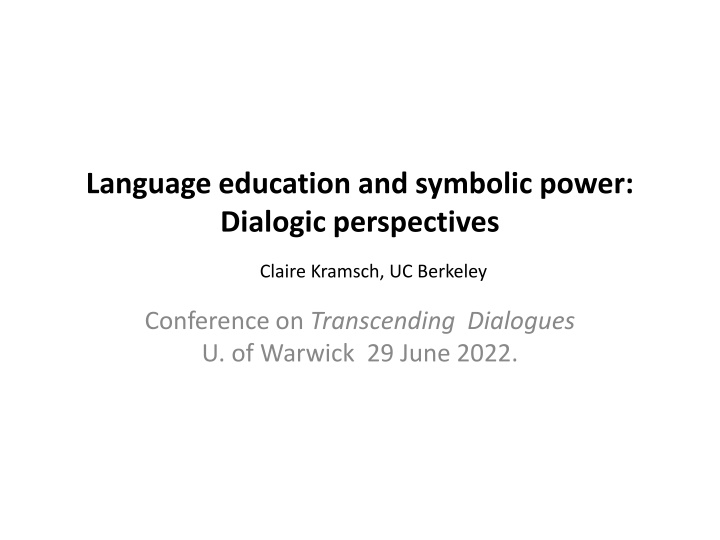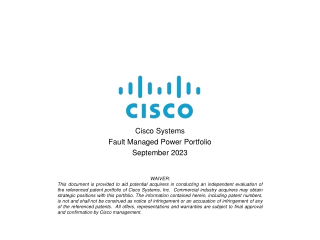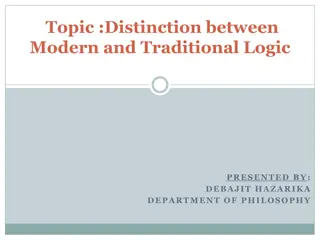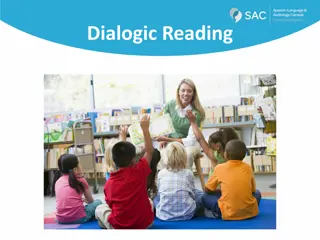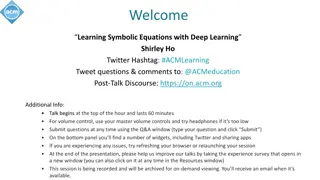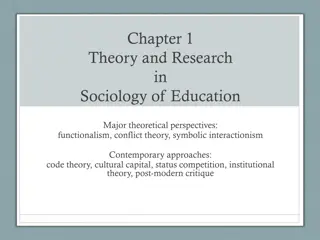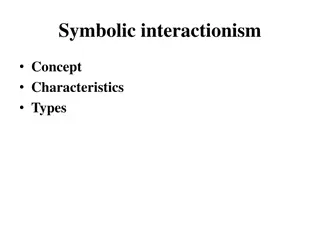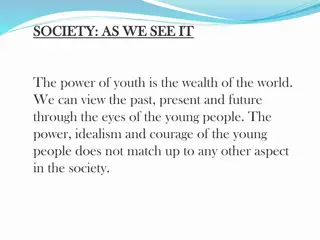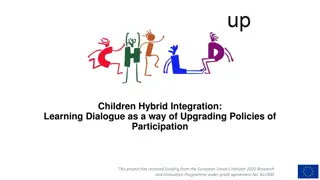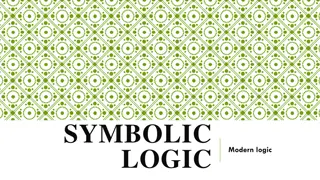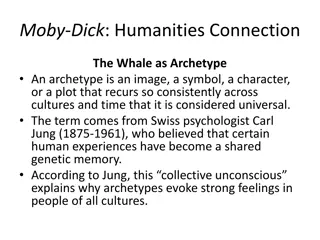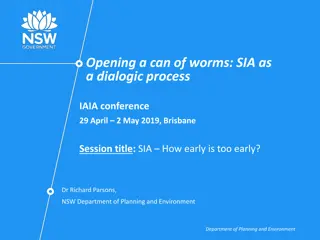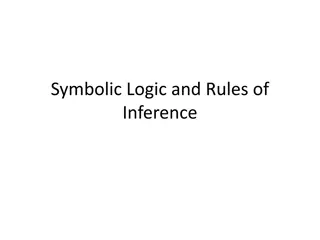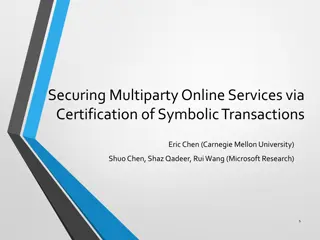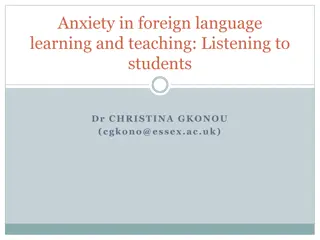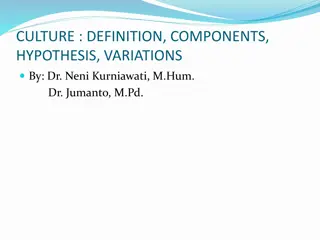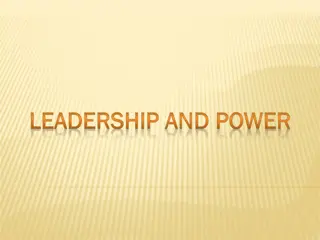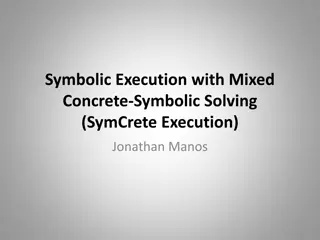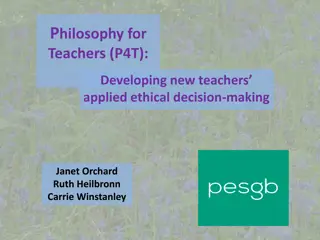Language education and symbolic power: Dialogic perspectives
In this discussion, Claire Kramsch explores the transformative power of dialogue in foreign language education, tracing its evolution from scripted exercises to authentic interactions and intercultural competences, ultimately leading to translingual practices in the digital age.
Download Presentation

Please find below an Image/Link to download the presentation.
The content on the website is provided AS IS for your information and personal use only. It may not be sold, licensed, or shared on other websites without obtaining consent from the author.If you encounter any issues during the download, it is possible that the publisher has removed the file from their server.
You are allowed to download the files provided on this website for personal or commercial use, subject to the condition that they are used lawfully. All files are the property of their respective owners.
The content on the website is provided AS IS for your information and personal use only. It may not be sold, licensed, or shared on other websites without obtaining consent from the author.
E N D
Presentation Transcript
Language education and symbolic power: Dialogic perspectives Claire Kramsch, UC Berkeley Conference on Transcending Dialogues U. of Warwick 29 June 2022.
Outline Introduction: What is dialogue? 1. A brief history of dialogue in SLA/Applied Linguistics 2. Conflicting perspectives 3. Teaching dialogue in a foreign language class 4. Five views: C.Chun, F.Dervin/M.Yuan, D.Block, J.Gray, M.Byram Conclusion: Reconstructing Babel not as punishment but as dialogue imperative
Introduction: What is dialogue? In normal parlance, dialogue refers to: Conversation between two or more persons. Antonym: monologue Communication between social groups or nations to achieve mutual understanding, not just exchange of information How has foreign language education fostered dialogue between persons , groups and nations with different histories and cultures?
1. A brief history of dialogue in foreign language education From fabricated dialogues in the 60s Practice reading these conversations aloud until you have memorized them A: Hier in K ln regnet es. Regnet es in Hamburg auch? B: Ja, in Hamburg regnet es auch (Lohnes & Strothman 1968) To authentic dialogues in the late 70s: (on the phone) Hi there! How s the weather in Hamburg? Oh, you know, miserable as always. How about in Cologne? To communicative competence in the early 80s: Expression, interpretation and negotiation of intended meaning (Breen/Candlin 1980) To interactional competence in the later 80 s Input and interaction (Long 1984, Kramsch 1985)
To intercultural communicative competence (in the late 90s) Savoir, savoir faire/comprendre/etre/s engager (Byram 1997) To transnational world citizenship (early 2000 s) World citizenship education (Risager 2006, 2007), intercultural citizenship (Byram2008) To translingual practices and translanguaging (in the 2010 s) Multilingual education (Canagarajah 2013, Cenoz/Gorter 2015, Li Wei 2018) To tweets and postings in the information age ( Internet 1986, Google 1998, Facebook 2006, Twitter 2015). Links, Likes and Lol s on social media (Kramsch 2021) People interact now with their iphones, text and tweet with 160- 260 characters, post, repost and exchange information in constant communication with one another.
2. Conflicting perspectives Dialogue is seen as transactional The computer has slowly transformed our view of language, language communication and of ourselves . Transaction, exchange of information, texting, twittering, posting, social media networking (Kramsch 2021 Chs.7 & 8) Quantitative measures of success: number of friends, enrollments, attendees, readers, active participants in the classroom, hands raised, viewers registered on zoom events Values such as diversity, equity, inclusion, belonging, and social justice have become politically correct commodities Speed of response as sign of efficiency. Fluency rather than accuracy. Personal creativity rather than precision. Multilingualism as polyglottism (Gramling 2021). Emotional response trumps cognitive inquiry
Dialogue is seen as both connection and disconnection Digitization is changing our relationship with materiality with the world of nature and of human relationships. We are trained through technology (and tech corporations) to spend more time on screens and less time noticing and interacting with this touchable, smellable, feelable world. Social media in particular trains us to notice that which is large, loud, urgent, trending and distant, and to therefore miss the small, quiet importance of our proximate and limited, embodied lives.. . Industry is re-engineering our social and communal lives. We were told that social media would create deeper connections, that it would help spread democracy, that it would end loneliness. . . Recent studies [however] have shown that teenagers in the United States and worldwide increasingly report feeling lonely, even in a period when their internet use has exploded. (Warren 2022; see also Turkle 2011) Warren, Tish Harrison. 2022. We re in a loneliness crisis. Another reason to get off our phones. New York Times 2 May .
Dialogue is advocated as politically engaged relation to others Byram on intercultural citizenship (2021): In British English . . . political means Relating to or concerned with public life and affairs as involving questions of authority and government; . . .The definition of politics is the political ideas, beliefs, or commitments of a particular individual, organization, etc. . On the basis of these two definitions, to say that Learners are or become politically engaged means that they develop their own ideas, beliefs and commitments, become involved in public life and practice politics, and may therefore challenge authority [at any level family, school, sports club, national and international government] . This is the definition of which intercultural citizenship is based. In the European and North American traditions most if not all teachers would agree that developing ideas and becoming involved in practical politics/activities, are necessary and widely accepted aims in education. Most, too, would agree that learners should challenge , and be independent thinkers. Being political in this sense is therefore not problematic as an aim for teaching (Byram 2021:123).
Pennycook on translingual activism (2019): Rather than focusing on more traditional questions of citizenship or social justice, there is a return here to alternative anarchist roots, drawing on a range of thinkers from Mikhail Bakunin or Ivan Illich to the postanarchist thought of Michel Foucault and Judith Butler (Day 2005, Kuhn 2009) . . . we have to reconsider our politics, epistemologies, and pedagogies . . . through much more grounded analyses of local language practices and assemblages (Pennycook 2017, 2018), of the ways in which people, politics, place, economics, policy, practices, and things come together. . . Moving beyond the rally, union, or ballot box to explore new modes of politics, new modes of resistance have focused on more anarchist traditions of social media-connected occupation (Martin Rojo 2016) (Pennycook 2019:179-180). If our critical activist resourceful speakers are to speak otherwise, they need not merely a form of principled polycentrism that enables a diversity of resources and meanings in educational contexts, not only a challenge to the zero point of English articulation, but also a translingual activism that seeks to connect their resources to political action aimed at decolonizing both public spaces (such as schools) and languages (such as English). (182)
3. Teaching dialogue in a foreign language class An article, five rejoinders and a response in JALPP 16:3 (2019@2022) Forum Discussion Kramsch, Claire. 2022a. Between professionalism and political engagement in foreign language teaching practice. Forum Discussion. Journal of Applied Linguistics and Professional Practice (2019@2022) 16:3, 335- 416. https://doi.org/10.1558/jalpp.20270 Block, David. 2022. To the limits of the political in foreign language teaching: A rejoinder to Kramsch 2022a. JALPP 16:3, 388-397. https://doi.org/10.1558/jalpp.21087 Byram, Michael. 2022. The political and the ethical in language teaching. A rejoinder to Kramsch 2022a. JALPP 16:3, 398-406. https://doi.org/10.1558/jalpp.21088 Chun, Christian. 2022. Encouraging critical and analytic skills in the classroom? A rejoinder to Kramsch 2022a. JALPP 16:3, 359-364. https://doi.org/10.1558/jalpp.21084 Dervin, Fred & Mei Yuan. 2022. Political ideology and atonality in language and intercultural education. A rejoinder to Kramsch 2022a. JALPP 16:3, 365-379. https://doi.org/10.1558/jalpp.21085 Gray, John. 2022. Some thoughts on the state we are in. A rejoinder to Kramsch 2022a, 380-387. https://doi.org/10.1558/jalpp.21086 Kramsch, Claire. 2022b. Defining the political in foreign language teaching A response to the rejoinders, 407- 416. https://doi.org/10.1558/jalpp.21269
From: Annamaria Bellezza (in press) Politics is not a dirty word! Acting out the conflicts in the Italian classroom . In: Adler R., Bellezza A., Kramsch C., Shibahara C. & Zhang L. Teaching the conflicts in American foreign language education. In Bojsen, Heidi, Merse, Thorsen & Rauschert, Petra (Eds.) Translanguaging and epistemological decentring in higher education and research. Clevedon, UK: Multilingual Matters. Survey of 3 Italian classes taught in Sp.2020: 38/40 students find discussion of controversial topics in the language classroom essential , a must for understanding cultural differences. 37 students are bilingual with Italian being their 3d or even 4thlanguage. S1: In this class I have learned that politics is not a dirty word ! S2: American politics is in fact what we will need to explain when we go abroad, we will be asked our opinions on a range of topics, and as much as learning the Italian words for fruits and vegetables might be useful, it will not help us in a conversation on the Trump administration or the rise of populist movements in Italy. We should be exposed to more relevant vocabulary .
Italian through Theater: from Page to Stage: a performance course where students read, analyze, interpret, and perform scenes and monologues from various Italian texts. Based on Pirandello s (2007) existentialist play Six Characters in Search of an Author, students were asked to rewrite their own existential play in the multicultural context of the times we were living, dealing with a provocative or sensitive issue of their choosing. Over the course of five weeks, students were asked to: write a story in narrative mode set in the context of the times we were living, as writers tell the story orally to the class, as storytellers adapt the story for the stage and write a script, as playwrights edit each other s scripts collaboratively, as editors cast students to play the multiple characters they created, as directors perform the parts assigned to them, as actors reflect as critics on (a) the interpretation and performance of their work by others; (b) their interpretation and performance of other students works; (c) the way in which embodying the conflicts in the stories told by students helped them better understand other perspectives.
Adaptations of Pirandellos play presented by students had the following titles:, Six nurses in search of a mask, Six students in search of a cause, Six women in search of equal pay, Six inmates in search of justice, Six scientists in search of a vaccine. Six immigrants in search of a border. Script written by a first generation Mexican-American female student. Her casting: a white-American student of European descent was cast to play Jos , a first generation Mexican-American illegal immigrant. Jos s character was based on the student s real cousin who got infected with Coronavirus after being released from prison. a white Italian-American student was cast to play Kevin, a young white American Border Patrol guard. Jos is trying to get Kevin to empathize with the struggles of the six characters just like in Pirandello s play. Original text is in Italian, translation by the teacher.
Jos: I lost five years of my life at Soledad Prison for a crime I did not commit. Kevin: I am sorry, but I believe in our justice system. Jos : You are sorry? And what justice? Do you know what s like to look like me, no job, no education, and an accent Kevin: I have an accent, so what. Jos : No, my Chicano accent. Kevin: Look, I have many Mexican friends Jos : Your bourgeois international friends from Mexico City don t count. They are like you. (he looks at Kevin straight into his blue eyes) Kevin: Right, I guess we all have to be poor and brown to get it. Jos : (pauses, then tries a different approach) What s the word border to you? Kevin: A line separating two countries. Jos : Do you know what it means to me? Do you know what it means to Amir, to Kayla, to Malek who walked for days, got robbed, got raped, and saw family members drowning in the middle of the Mediterranean Sea when their rickety, overloaded boat capsized on their way to Italy? Kevin: I am sorry, I truly am, but what do you want me to do? Solve the problems of the world? Do you also want to blame me for getting the virus? Jos : Yes, I am. We had no access to information, no access to masks, didn t have the luxury to work from home like you people (pauses) ever tried to put yourself in our shoes?
After the performance: Jos : I learned a lot about the plight of immigrants, wrote essays about it, watched movies on the subject, but I never really got it until I worked through this scene: playing a Mexican immigrant in search of a border had a profound impact on my view of immigrants in general, as I truly felt his pain when I spoke his words, which caused me to move my body in a certain way, and say things I wouldn t otherwise have said, when I had to struggle to put myself in his shoes and call out injustices that, as part of the dominant culture, I am a part of
Claire: How did Jos s line: What s the word border to you? sound in Italian? Annamaria: The original phrase in Italian was " Cosa vuol dire la parola confine per te?", which literally means "What does the word border mean to you?" We discussed in class the use of confine as opposed to frontiera - two words, which are sometimes used as synonyms in Italian . Confine is understood as a geographical, static boundary separating spaces belonging to the same culture or different cultures that recognize each other a known world. Frontiera, on the other hand, is seen as representing the threshold of demarcation that separates the known from the unknown, order from disorder, civilization from barbarism. Kevin understood the word border as "confine" while Jos imagined it as "frontiera". The Italian word that was ultimately agreed upon in the scene in Italian was confine, even though in Jos 's imagined world it was a frontiera, where future scenarios of possibilities could be imagined. Both students had to stretch quite a bit in order to enter into characters with biographies very different from their own. The white student who played Jos was of Northern European descent from the conversations we had in class, it seems like he came from a privileged background in terms of financial and social capital, and I think that is in fact the reason the female student of Mexican descent who wrote the scene cast him to play Jos . The Italian-American student who played Kevin came from a very liberal, activist background, with ancestors having gone through Ellis Island, and he was cast to play Kevin, in a role that was not comfortable for him. Kevin had to be literally confined into the word confine while Jos in a way, was more free to cross over, expand, explore, reach out because of the malleable nature of his frontiera.
4. Five views Christian Chun: Dialogue as discursive co-construction Chun picks up on the translanguaging process and its political overtones: the political is discursively and materially realized in its dialogic co-constructions within the media, the economy, culture, identity, affect, and education (my emphasis). Discourses surrounding the translation of terms like border into confine or frontiera are worth discussing with students even at the lower levels. Fostering linguistic meta-awareness makes students rethink not only the history taught to them in high school, but also current military policies of their government, as is clear in the case of the student in Annamaria's Italian class who changed his view on immigration. In fact it stimulates imaginative thinking and encourages critical and analytical skills of not only our students, but also us.
John Gray: Dialogue as trans-lation The tension between, if not the incompatibility of, the teachers expression of their political identities and the (supposedly apolitical) model of professional identity required by the university is evident. Increasingly, the dominant model of professional identity for foreign language teachers at all levels is that of effective practitioner. Teachers ascribed this identity are expected to keep their political (and other) identities outside the classroom, making it difficult for them to lay claim to other professional identities such as that of reflective practitioner, critical pedagogue or indeed that of translingual activist. What those in our field making the case for translanguaging approaches (Garc a et al. 2021) and translingual activism (Pennycook 2019) today seek to redress is the erasure of a genuine educational understanding of foreign language teaching and learning. On the one hand, there is what might be called the Humboldtian tradition (as found, for example, in the work of Michael Byram) which holds that L2 learning offers students the opportunity to relativise their world view and to learn about others and the ways in which they encode the world, while simultaneously enabling them to reflect on themselves and their own language using. And, on the other, there is the case for decolonising foreign language teaching (Macedo 2019), in which a rigidly monolingual pedagogy is resisted and in which translation (as recommended in the Discussion Forum) is brought centre stage. Translation is in fact central to foreign language learning and indeed to all language using. (Gray 2022)
Fred Dervin and Mei Yuan: dialogue as exercise in atonality By advocating going beyond tonality in language education, Fred Dervin and Mei Yuan use a concept from Sch nberg s music, a musical feature that [removes] functional harmony as a primary structural element . They suggest removing the correspondence of words and world that speakers take for granted in their L1. Atonality serves as a good metaphor for what we (and Kramsch) wish to infuse in political engagement and language education. . .The tonality of our language must be disrupted when we engage with politics in another language (or in our own language if used as a lingua franca). The trompe l oeil of the comprehensible can work against understanding, coming together and even discursive equality. Approaching a given term (e.g. ethnic) in one s own language and the target language without reflecting on what it could mean and especially taste for an other is problematic and contributes to hegemonic thinking. They suggest that an intercultural approach to teaching language should be to empty words of their tonality in order to open oneself to others without the ideological baggage that these words carry. They see such an atonality as the very condition for intercultural understanding: Without this process of atonalizing the words we use, and thus the ideologies they contain, it is impossible to work together in a transparent and fair way hidden ideologies win over and thus puts one of us down. Ex. removing the tonality of the American word Frontier when teaching the Italian word frontiera .
Michael Byram: Dialogue as transformative political action Byram understands politics as taking an interest and action in improving the community or communities in which one lives (Byram et al 2021: 311) and works with teachers on the ground. In both cases, the concept of the political is broadened from party politics to politics as transformative action, as in Byram s assertion that all education is transformative and most learners tacitly agree to the transformation as they attend educational institutions (Byram 2022). While many language teachers at higher educational institutions might not agree that their mission is to transform their students (Kramsch & Zhang 2018), most students would agree that they feel sometimes transformed by the education they have received. In that sense the German concept of politische Bildung based on cultural and social democratic values is an apt metaphor to capture how Byram, echoing Peter Doy , sees political action (Kramsch 2022b).
Byram calls for citizenship education, including global citizenship (Luetge 2022). The development from intercultural competence to intercultural citizenship which has taken place - led by people like Melina Porto and Manuela Wagner - based on my 2008 book and other publications in Durham, has really taken students into the streets, to engage with members of the public, but not in anarchy. The position is internationalist and reformist internationalism rather than revolutionary internationalism. I am happy that people have done this because for me foreign language teaching is part of general education, as you know, and in particular it has a role to play in citizenship education. I find now that policy makers are saying this too. I did a lecture yesterday for LEND, the Italian association of language teachers, and referred to Italian education policy which since 2017/18 requires all teachers to play a part in citizenship education; I was talking about what language teaching can add to citizenship education. (Byram pers.comm. Wed.Sept.22, 2021) Question: Teaching English in China so that Chinese citizens can better understand the English- speaking world or can better make the Western world understand China through its own Western language ?
David Block: Dialogue as discussion of historical and political economic conjuncture Block feels that there are limits to the ability of teachers to discuss politics in the FL class. Reacting to the account of Annamaria s class, he writes: I see nothing wrong with an in-depth discussion about the possible meanings of one single word, especially when the word is so vital to the discussion of migration. In addition, I have always found Lakoff s work on metaphor and cognition compelling. However, rather than focussing on the surface level choice of a word (no matter how deeply the semantic roots of that word goes) or even on anti- migration and anti-migrant discourses circulating in Italy (the backdrop to the discussion of border ), why not go to the history of fascism in Italy, the nature of political party politics in Italy in the post- World War 2 era and above all, the political economy of neoliberalism in Italy from the 1980s onwards? For it is in these conjunctures that we find the historical roots of, and the underlying mechanisms generating, the surface level events that we witness in this country today. So, while I see nothing wrong with what I have read about Annamaria s class, I would be more interested in examining how the anti- migration discourses in circulation in Italy today are embedded in the conjunctural phenomena just cited.
Another potential shortcoming I noted in these examples has to do with a certain tendency for the FLT professionals to frame conflicts in terms of culture, which to some extent is fine, while erasing from the scene political economic realities, which is not fine. Of course, this is not down to Kramsch at all, but it is symptomatic of a certain culturalist approach adopted by many in education when it comes to taking on the political. In short, for far too many educators, the political works nearly exclusively at the discursive and symbolic level and it is generally understood to be about a lack of recognition of and respect for others, or (intercultural) misunderstandings in need of resolution, or a lack of empathy, often framed as the inability to put oneself in the shoes of the other. However, while this approach does allow the teacher and students to bring issues to the surface for discussion, it is ultimately limited. In the end, I find myself thinking about the basic idea developed in this paper bringing the political into language teaching but doing so in what I think is a bigger-picture, more encompassing and less piecemeal way. As I argue elsewhere with regard to sociolinguistics (Block 2018), there is the need for a truly interdisciplinary approach, bringing all of the social sciences to bear in the analysis of real-world events and phenomena while highlighting the political economic side of things. (Block 2022)
My response Transcending dialogue Going beyond interaction/transaction to truly engage with others is a political process, in the sense of managing our relationship with other members of the Greek term polis or group of people interested in managing their living together as members of a city, nation, or community. The global means of communication have changed our understanding of what keeps us together. Transcending dialogue would mean recapturing what dialogue really means: not posting, shouting, tweeting and retweeting, but listening, analyzing, interpreting, translating, rephrasing, contextualizing and rehistoricizing, i.e., constructing and reconstructing the tower of Babel.
In guise of conclusion Pieter Bruegel the Elder - The Tower of Babel (Rotterdam) - Google Art Project - edited.jpg Pieter Bruegel the Elder - The Tower of Babel (Vienna) - Google Art Project - edited.jpg
Reconstructing Babel not as punishment, but as dialogue imperative Pieter Breughel the Elder s (1563) unfinished tower dramatically foregrounds the difficulties associated with the translation of the king s vision into the architects plans, and the architects blue print into the actual structure of the building, as well as the passageways, footpaths, arches, corridors and other communication channels that enabled its construction. In this sense, the tower of Babel can serve as a metaphor for the interdisciplinary work David Block talked about: the short term brickmaking / bricklaying and the cultural empathy needed by the workers, and the long term vision needed by the king, the architects, the sociologists, anthropologists, and theologians - all called to both use and transcend dialogue for intercultural understanding between heaven and earth.
If every speech act performs the task of mediating something, the act of translation does this potentially, mediating between mediations, or being (. . .) in the service of understanding of the unterstanding (Verstehen des Verstehens). In this sense Pieter Breughel the Elder had all the details right in his painting of the Tower of Babel of 1563. Whether interpreted as a ruin or a building site, the gigantic structure of world culture consists of a confusing wealth of arches, pillars, and stories linked with one another. As the Old Testament assures us reproachfully, but the cuneiform scripts in an affirmative manner, the whole structure was intended as a bridge: etemenanki, the foundations of heaven and earth, were to link the two poles of existence of the world under and above (. . .) Both in their cultures and between cultures, human beings are all pontifices, or bridge-builders. (Streck 2003:196). Streck, Bernhard. (2003). The task of the Humanities. Translation as Pontificium. In: Maranhao, Tullio & Bernhard Streck (Eds.) Translation and ethnography. The anthropological challenge of intercultural understanding. Tucson: U of Arizona Press.
Thank you! ckramsch@berkeley.edu
